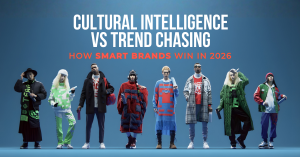Should brands chase global recognition with international celebrities, or should they focus on authentic local engagement through South African influencers and digital creators
In a world of hyper-data and overstimulation, it is becoming harder and harder for brands to differentiate themselves from their competitors for the mindshare of their target audiences and consumers. This is further exacerbated by the fact that marketing budgets are being slashed to smithereens as brands question whether there is any real return on investment for each rand spent on marketing. Influencer marketing endeavours to ensure brands can connect with engaged audiences through the influencers and content creators whose opinions they value.
If we are to distill this into its rudimentary forms, influencer marketing is no different to the old-school “Word-of-Mouth” doctrine that is as old as time itself. The idea is that people trust people more than they trust the brands to be honest about the experience or service they provide.
It should follow then that social media and the use of influencers should be regarded as some sort of electronic Word-of-Mouth. Word of Mouth is only as credible as the person who is sharing the information. For example, a mother will only take recommendations from other mothers who are in a similar position to their own on whether a certain home remedy is effective. It would be rare for the mother to take the advice of someone who has never had children or been in a position to look after children.
The investigation we must undertake is whether the source of the information is a credible source for the information to be deemed useful and credible word of mouth. I propose that the real question is whether there is a connection between the source of the recommendation, the person sharing the word-of-mouth, with the person seeking the information, and the prospective customer or client relying on the word of mouth.
There are certain things that are idiosyncratic to the South African Experience that cannot be replicated. Consider for a moment the complexity of the phenomenon of “Black Twitter”. It is complex because it is difficult to explain the intricate nuances that exist on that platform, yet, for those who are part of Black Twitter (nee “X”) they share an understanding of the nuances, rules, common experiences and lexicon that is hard to share to people outside the platform.
The use of celebrity influencers is not new, we have had celebrity endorsements for as long as there has been popular media. Although the popularity of the celebrity will be transferred onto the product they are endorsing, there is a lack of connection between the celebrity and the audience. This is worse when it comes to celebrities that have a more global appeal. It is called the Pinocchio effect, where audiences can clearly see that there is no real connection between the celebrity and the product they are endorsing and thus there is no connection between the celebrity and the audience they seek to influence.
If we look at the recent collaboration between American Rapper Rick Ross and Pick ’n Pay Smart Shopper. Although the collaboration is entertaining, the entertainment value comes from the absurdity that multimillionaire and global sensation Rick Ross shops at the local Pick ‘n Pay. This may have increased talkability around the Pick ‘n Pay brand but I doubt it would have–or has– translated into actual significant sales. This is because we know that Rick is not the Pick ‘n Pay shopper who is after savings through the use of his Smart Shopper Card.
South African audiences, when looking to make a purchase, are swayed by the opinions of Social Media Influencers that they are connected to whether by demographic, experiences or other mutual likeness less than global superstars that they share very little similarity with. They need to be able to see themselves in the influencer. In the consumer buying process, influencers must:
- Entice the prospective consumer that they have a need that they share with the influencer;
- Trust the information given by the influencer because they are connected through some sort of likeness;
- Make the purchasing decision based on the information and trust shared by the influencer.
The above three points need connection in the form of the consumer recognising themselves in the influencer or their experiences.
Now, should brands chase global recognition with international celebrities, or should they focus on authentic local engagement through South African influencers and digital creators?
It depends on the results they want to achieve. If they are after brand awareness and entertainment value then they may find it useful to use a global superstar to shock and entertain, but when looking to make meaningful connections with their consumers, they need to look a little closer to home.




